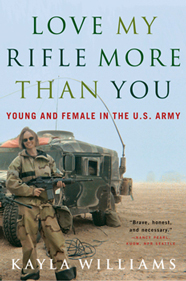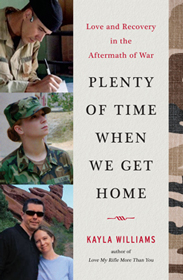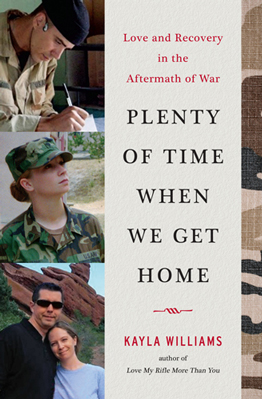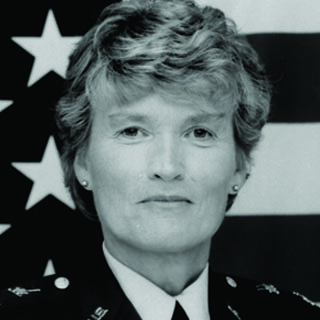Kayla Williams is a former sergeant and Arabic linguist in a Military Intelligence company of the 101st Airborne Division (Air Assault) and the author of two memoirs, mentioned below. During her deployment to Iraq, Williams was at the forefront of troops' interaction with Iraqis while also navigating the challenges of being part of the 15% of the Army that was then female. She serves as an advocate on behalf of service members and veterans wrestling with invisible wounds of war such as Post Traumatic Stress Disorder (PTSD), Traumatic Brain Injury (TBI), and Military Sexual Trauma (MST) – as well as their families and caregivers – and is an authority on women in the military and gender integration.
Williams is now a Senior Policy Researcher at the RAND Corporation, where she focuses on military personnel policy and veteran policy. Most recently, she was Assistant Secretary of Public and Intergovernmental Affairs at the Department of Veterans Affairs (VA), where she oversaw Department-wide intergovernmental and international engagement, media relations, public affairs, and outreach to veterans, their families, and other stakeholders. She was also the VA representative on the 2021 Department of Defense Independent Review Commission on Sexual Assault and Harassment in the Military, working collaboratively with other subject matter experts to develop comprehensive recommendations to improve prevention and response over a 90-day sprint, all of which were accepted by Secretary of Defense Austin and are now being implemented by DoD. Williams also served on the Biden-Harris Agency Review Team for VA, participating in a broad review of the agency and helping set the agenda for the incoming leadership team’s first year running an agency with a budget of over $240 billion, over 400,000 employees, and millions of beneficiaries. All these roles have given her a deep understanding of how to advance policy and communicate effectively with diverse stakeholders in a complex landscape.
She served for two years as Director of the Center for Women Veterans at VA, where she was the primary adviser to the Secretary on department policies, programs and legislation affecting women veterans (2016-2018). She served as a Senior Fellow and Director of the Military, Veterans, and Society Program at the Center for a New American Security (2018-2020), where her research focused on traditionally underserved veteran communities, including conducting groundbreaking research on racial/ethnic minority and LGBTQ+ veterans. She previously worked eight years at the RAND Corporation conducting research on service member and Veteran health needs and benefits.
Kayla currently serves on the Out in National Security Advisory Board and the Armed Services Arts Partnership Artist Council. She has previously served as a member of the Department of Labor Advisory Committee on Veteran Employment, Training, and Employer Outreach (ACVETEO); Army Education Advisory Committee; and VA Advisory Committee on Women Veterans. Her honors and recognitions include Student Veterans of America Distinguished Public Service Award, 2020; HillVets 100 Top Influencer, 2018; We are the Mighty 25 Veterans to Watch, 2017; American University School of International Service Alumna of the Year, 2017; Lincoln Award Recipient, 2015; and White House Woman Veteran Champion of Change, 2013.
Her 2005 memoir Love My Rifle More Than You: Young and Female in the U.S. Army, chronicles her experience as a female soldier in the U.S. army, and details the hardships of the soldiers and the Iraqi people they met during their tours of duty. Her memoir is a tale of female empowerment and self-discovery that provides an unvarnished behind-the-scenes look at what women experience while serving in the male-dominated military.
Her second memoir, Plenty of Time When We Get Home: Love and Recovery in the Aftermath of War, details her family’s journey from trauma to healing after her husband sustained a penetrating traumatic brain injury in combat and subsequently develops post-traumatic stress disorder. She reveals intimate and excruciating details of the challenges they encountered navigating complicated systems of care – and turning their struggles into lives dedicated to advocacy on behalf of others. After 5 years of service Kayla Williams left the U.S. Army and began the process of healing alongside Brian. She speaks about her time at war, her love and recovery with Brian, and improving systems and services for troops and veterans.
Williams has testified before the House and Senate VA committees and appeared on numerous media outlets including NPR, CNN, MSNBC, and Fox News to speak about her personal experiences and professional expertise to advocate for institutional changes related to gender equality in the military, caring for wounded warriors, and other topics.
An Ohio native, Williams graduated cum laude with a BA in English Literature from Bowling Green State University and earned an MA in International Affairs with a focus on the Middle East from American University.
Selected Publications:
- Blogs and op-eds on military and veterans’ issues published in multiple outlets, recently including:
- https://www.nytimes.com/2023/05/28/opinion/memorial-day-honor.html
- https://thehill.com/opinion/national-security/3903685-improving-inclusion-of-women-veterans/
- https://www.rand.org/pubs/commentary/2023/07/bill-would-ban-care-for-transgender-veterans-the-scientific.html
- https://thewarhorse.org/american-military-veterans-bear-cost-of-wars-and-its-growing/
- https://thewarhorse.org/a-toxic-legacy-of-dont-ask-dont-tell-and-its-lingering-effect-on-veterans-and-military-families/
- New York State Minority Veteran Needs Assessment, CNAS, 2020 (lead researcher).
- Sexual Assault and Sexual Harassment in the U.S. Military, RAND, 2014-2015 (contributor).
Programs:
- Keynote Presentation: My Life in the MIlitary & Journey Beyond - An uplifting and inspiring presentation of the author’s history of overcoming adverse experiences during her military career and caregiving journey.
- Women in the Military: Presentation includes a brief history of women’s military participation and discussion of the author’s own experiences, including reading excerpts from Love My Rifle More Than You.
- Caregiving: Presentation on her family’s journey from war trauma to healing, including reading excerpts from Plenty of Time When We Get Home.
- Telling Your Truth: 90-minute generative personal writing workshop that includes discussion of genre and publication considerations.
- Military Sexual Trauma: Overview for mental health care providers and other professionals who would benefit from knowing more about the prevalence and consequences of MST (includes optional interactive Q&A).
- Combat PTSD and TBI: Overview for professionals who would benefit from knowing more about the prevalence and consequences of these invisible wounds on veterans and their caregivers (includes optional interactive Q&A).
- Minority Veteran Needs Assessment: Presentation of how women, racial/ethnic minority, and LGBTQ+ veterans are faring across the life domains of health, housing stability, financial stability, and social support.
- Perceptions of Veterans: Interactive audience engagement exercise about service members and veterans (view first iteration).
- Classroom or Other Small Group Discussion: Short introductory remarks and moderated Q&A with students, student veterans, or employee resource group.
- Note: Visit can include more than one program; presentations can be tailored to meet unique or specific audience needs. Inquire about bespoke programs.

Kayla Williams is one of the 15 percent of the U.S. Army that is female, and she is a great storyteller. With a voice that is “funny, frank and full of gritty details” (New York Daily News), she tells of enlisting under Clinton; of learning Arabic; of the sense of duty that fractured her relationships; of being surrounded by bravery and bigotry, sexism and fear; of seeing 9/11 on Al-Jazeera; and of knowing she would be going to war. With a passion that makes her memoir “nearly impossible to put down” (Buffalo News) Williams shares the powerful gamut of her experiences in Iraq, from caring for a wounded civilian to aiming a rifle at a child. Angry at the bureaucracy and the conflicting messages of today’s military, Williams offers us “a raw, unadulterated look at war” (San Antonio Express News) and at the U.S. Army. And she gives us a woman’s story of empowerment and self-discovery.

Brian, on his way back to base after mid-tour leave, was wounded by a roadside bomb that sent shrapnel through his brain. Kayla waited anxiously for news and, on returning home, sought out Brian. The two began a tentative romance and later married, but neither anticipated the consequences of Brian’s injury on their lives. Lacking essential support for returning veterans from the military and the VA, Kayla and Brian suffered through post traumatic stress amplified by his violent mood swings, her struggles to reintegrate into a country still oblivious to women veterans, and what seemed the callous, consumerist indifference of civilian society at large. Kayla persevered. So did Brian. They fought for their marriage, drawing on remarkable reservoirs of courage and commitment. They confronted their demons head-on, impatient with phoniness of any sort. Inspired by an unwavering ethos of service, they continued to stand on common ground. Finally, they found their own paths to healing and wholeness, both as individuals and as a family, in dedication to a larger community.
Women at War: Old Stories, New Voices
Appearing on the Alyona Show
Iraq War veteran Kayla Williams talks about her and her husband's return from Iraq and the major problems they faced reintegrating into American socie
U.S. Department of Veterans Affairs. Celebrating the many accomplishments of women Veterans as Champions of Change.
Plenty of Time When We Get Home
“A must-read for military spouses, caregivers, and anyone hoping to gain an understanding of the challenges faced by soldiers coming home. Kayla and Brian’s perseverance is a tribute to the power of the human spirit to not only survive but to thrive.”
Marie Tillman, author of The Letter: My Journey Through Love, Loss & Life and founder of the Pat Tillman Foundation
“Part heartache, hard truth, love story, and an insider’s look at the back end of war, this book offers us a look behind the uniforms and the parades and into the damage of war’s wounds. In the end, it is a story about how love can ultimately heal.”
Lee Woodruff, author of In an Instant and Those We Love Most
“Kayla Williams’s raw, honest, and take-no-prisoners prose gives service members and families scarred by war the greatest gift of all―hope.”
Tanya Biank, author of Lifetime TV’s Army Wives and Undaunted: The Real Story of America’s Servicewomen in Today’s Military
Love You More Than I Love My Rifle
“You won't find another voice like Ms. Williams on your bookshelf, so unblinkingly candid, so aggressively raw and real."
Bob Shacochis, National Book Award winner, author of The Immaculate Invasion

